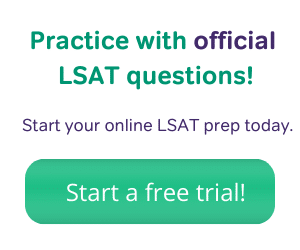Imagine, you’ve just gotten in the groove of your LSAT practice test. (Still need to take one? Check out Magoosh’s LSAT practice test complete with official LSAT questions!) Everything’s going fine until–WHAM! You’re hit with a tough logical reasoning question. It happens to the best of us. So if you’re reviewing your test and can’t figure out the PT 38 some educators claim question, read on! We’ll review nice and easy for you.

PT 38 Some Educators Claim Question Type
So what is the question type? The wording of the question is a little complicated. It essentially asks, “the passage provides grounds for accepting which answer choice?” In other words, this is basically a “most strongly supported” question type. Simply put, the question asks you to choose the answer that has the most support, or grounds for acceptance.
As we know from most strongly supported questions, we’re given a set of facts, asked to accept them as true, and we must pick an answer that can be reasonably inferred from that information. That means, you should be able to conclude at least one solid thing from the stimulus.
Question Summary

In sum, the passage describes the argument of some educators. Those educators claim that rather than covering many subjects superficially, students should learn only basic subjects in depth. This is because they won’t be prepared to study those subjects on their own if they didn’t get an in-depth understanding of them.
Answer A
With our mission in mind, let’s look at answer A. Should we be able to support it based on the stimulus? A says that it’s easier to understand plant and animal classification when you’ve learned how plants and animals can be useful.

A is a tricky answer. The test-writers must’ve hoped that you’d read it very quickly and miss a crucial part of it. A is almost correct. In the stimulus, the educators claimed that students will be empowered to learn more about a subject if they’ve learned the “investigatory techniques” relevant to it. But, A says that students will understand classification more easily if they’ve learned about the usefulness of plants and animals. But having a solid grasp of investigatory techniques is different from learning how the subject “can be useful.” That’s why is incorrect.
Answer B
Answer choice B says that it’s harder to remember the details of a boring and complex lecture than of an interesting, lively one. Is this supported by the facts of the passage?
If you re-read the stimulus, nothing about recalling details is mentioned. Neither is how boring or fun lectures are or should be. We’re talking about deeply understanding a subject. That’s why B is incorrect.
Answer C
C is similar to B. It says it’s easier to recall ideas explained by a teacher personally than ideas explored independently. But, is anything about that mentioned anywhere in the short passage? Nope! Let’s move on.
Answer E
E claims that learning many simple ideas well is easier than learning some complex ideas well. But that isn’t what the educators were talking about. They didn’t say whether learning a few basic ideas well is easier than learning complicated ones well. All they said is that they think students should get a solid, deep grasp of basic concepts so it’s easier to learn more about those subjects on their own.
Answer D
Finally, let’s go back to answer choice D. D says that after a student has analyzed a few Greek tragedies in depth, it’s easier to understand any Greek tragedy in the future. Is that supported?
Even though D mentions a very specific case, it definitely applies to the educators’ claim. When students learn a basic subject in depth (in this case, Greek tragedies), they can explore them independently (any new Greek tragedy that wasn’t covered in the basic overview). That’s why D is the right answer!
PT 38 Some Educators Claim Question
Have a better understanding of this question? Hopefully now you’re better equipped to tackle most strongly supported questions–and logical reasoning in general!






Leave a Reply